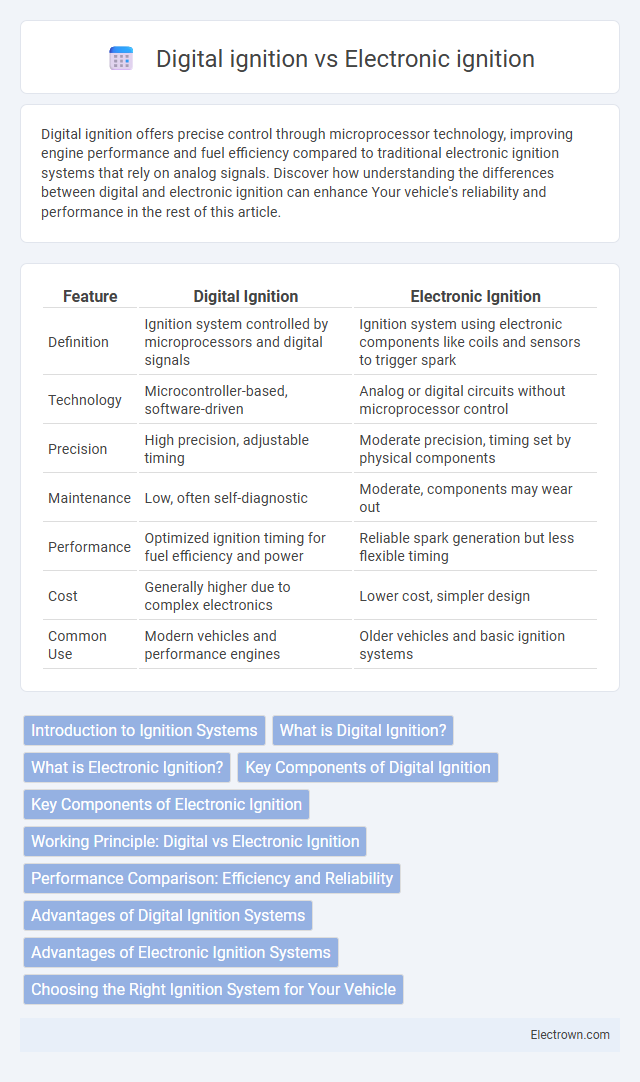Digital ignition offers precise control through microprocessor technology, improving engine performance and fuel efficiency compared to traditional electronic ignition systems that rely on analog signals. Discover how understanding the differences between digital and electronic ignition can enhance Your vehicle's reliability and performance in the rest of this article.
Table of Comparison
| Feature | Digital Ignition | Electronic Ignition |
|---|---|---|
| Definition | Ignition system controlled by microprocessors and digital signals | Ignition system using electronic components like coils and sensors to trigger spark |
| Technology | Microcontroller-based, software-driven | Analog or digital circuits without microprocessor control |
| Precision | High precision, adjustable timing | Moderate precision, timing set by physical components |
| Maintenance | Low, often self-diagnostic | Moderate, components may wear out |
| Performance | Optimized ignition timing for fuel efficiency and power | Reliable spark generation but less flexible timing |
| Cost | Generally higher due to complex electronics | Lower cost, simpler design |
| Common Use | Modern vehicles and performance engines | Older vehicles and basic ignition systems |
Introduction to Ignition Systems
Digital ignition systems use microprocessors to precisely control spark timing, improving engine efficiency and performance compared to traditional electronic ignition systems that rely on simpler electronic components. These systems optimize ignition timing by processing various sensor inputs in real-time, resulting in smoother engine operation and reduced emissions. Your vehicle benefits from enhanced reliability and fuel economy with digital ignition technology replacing conventional electronic ignition setups.
What is Digital Ignition?
Digital ignition is an advanced engine management system using microprocessors to precisely control spark timing for optimal combustion efficiency. It integrates sensors and real-time data processing to adjust ignition timing dynamically, improving fuel economy and reducing emissions compared to traditional electronic ignition systems. By replacing mechanical components with digital controls, digital ignition enhances engine performance and reliability in modern vehicles.
What is Electronic Ignition?
Electronic ignition is a modern ignition system that uses electronic circuits to control the timing and firing of the spark plugs, replacing traditional mechanical points. It improves engine performance by providing more precise spark timing, reducing maintenance, and enhancing fuel efficiency. You benefit from increased reliability and smoother engine operation compared to older ignition systems.
Key Components of Digital Ignition
Digital ignition systems rely on microprocessors, sensors, and electronic control units (ECUs) to precisely manage spark timing. Key components include the crankshaft position sensor, ignition coil, and control module, which work together to optimize fuel efficiency and engine performance. Your vehicle benefits from improved reliability and reduced emissions compared to traditional electronic ignition systems.
Key Components of Electronic Ignition
Electronic ignition systems utilize key components such as a control module, ignition coil, and sensors like crankshaft or camshaft position sensors to precisely time the spark delivery. This advanced setup enhances engine performance and fuel efficiency by replacing traditional mechanical breakers with solid-state electronics. You benefit from faster spark response and reduced maintenance compared to conventional digital ignition systems.
Working Principle: Digital vs Electronic Ignition
Digital ignition systems utilize microprocessors to precisely control spark timing by processing real-time engine data, optimizing performance and fuel efficiency. Electronic ignition relies on sensors and electronic control modules to switch the ignition coil on and off, generating the spark without mechanical points, improving reliability over traditional systems. Your vehicle benefits from digital ignition by achieving more accurate and adaptive spark control compared to conventional electronic ignition setups.
Performance Comparison: Efficiency and Reliability
Digital ignition systems offer enhanced efficiency through precise spark timing control, optimizing fuel combustion and improving engine performance compared to traditional electronic ignition. Electronic ignition provides reliable spark delivery but can suffer from timing inconsistencies and reduced adaptability under varying engine conditions. Overall, digital ignition systems deliver superior reliability and fuel efficiency, reducing emissions and maintenance requirements.
Advantages of Digital Ignition Systems
Digital ignition systems offer precise control over spark timing, improving engine efficiency and reducing fuel consumption. Their advanced microprocessor technology enables better adaptability to changing conditions, resulting in smoother engine performance and lower emissions. Your vehicle benefits from enhanced reliability and easier diagnostics compared to traditional electronic ignition systems.
Advantages of Electronic Ignition Systems
Electronic ignition systems offer precise timing control, which significantly improves engine efficiency and reduces fuel consumption compared to traditional digital ignition. Enhanced reliability and reduced maintenance needs result from the elimination of mechanical parts prone to wear, such as contact points. These systems also provide stronger spark energy, resulting in smoother starting and better overall engine performance in various operating conditions.
Choosing the Right Ignition System for Your Vehicle
Choosing the right ignition system for your vehicle hinges on performance needs and reliability preferences. Digital ignition offers precise timing control and better fuel efficiency through microprocessor-based management, while electronic ignition provides a simpler, more cost-effective solution with improved durability over traditional systems. Assess your vehicle's requirements and driving conditions to determine whether the advanced accuracy of digital ignition or the proven robustness of electronic ignition best suits your automotive performance goals.
Digital ignition vs Electronic ignition Infographic

 electrown.com
electrown.com